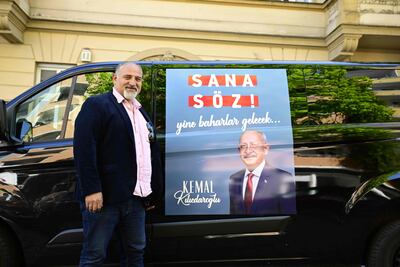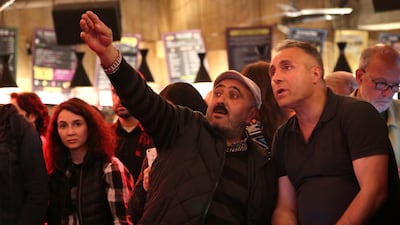The Turkish diaspora in Europe gave President Recep Tayyip Erdogan a boost in his tight re-election race, preliminary results showed on Monday.
In Germany, where the Turkish community of three million is the largest abroad, Mr Erdogan was ahead with 65 per cent of votes to 33 per cent for his challenger Kemal Kilicdaroglu.
Hundreds of Erdogan supporters formed a convoy in Dortmund, western Germany, as results in Turkey showed the President narrowly ahead but heading for a run-off vote.
Mr Erdogan led by wide margins among expats in Belgium, Austria, the Netherlands and France, while Mr Kilicdaroglu led among Turkish voters in the UK and Switzerland.
The figures were published by Turkey’s Anadolu Agency, whose results were not complete in all areas and were disputed by some opposition figures.
A large pro-Erdogan vote had been expected in Germany, where the Turkish population is generally older, despite cool relations between Berlin and Ankara.
Mr Erdogan’s popularity has been credited to his vocal defence of Turkish national identity and a feeling that Turks are sometimes made to feel unwelcome in Germany.
“Society here is a reflection of society in Turkey,” said Bulent Bayraktar, the head of a Turkish community group in Nuremberg. "Harsh language or divisive words from party officials naturally find an echo here."
More than half a million people cast votes in 2,000 ballot boxes in Germany, after campaigns laid on buses to take people to a polling station at a Turkish consulate in Berlin.
One German MP of Turkish descent, Serap Guler, said the close election result represented a failure for Mr Erdogan and his ruling Justice and Development Party (AKP).
“He has the entire state and media apparatus behind him,” she said.
“This was not a fair election, but one with unequal resources — nonetheless he has to go to a run-off. A real loss of face for him”
Another opponent of Mr Erdogan, liberal Muslim activist Eren Guvercin, accused the President of pursuing an “aggressive identity politics” that “will continue to grow here in Germany”.

European Commission president Ursula von der Leyen said the high turnout in the election was "really good news".
"It’s a very clear sign that the Turkish people are committed to exercising their democratic rights," she said.
In France, left-wing MPs Danielle Simonnet and Jean-Christophe Sellin said the results from Turkey “confirmed a strong division in the country”.
“It is still possible to hope for a turning of the page from the repressive Erdogan regime, which is incapable of resolving Turkey’s various problems,” they said in a statement.
Critics of Mr Erdogan say his camp was distorting the early picture by disputing individual ballots for Mr Kilicdaroglu and delaying their inclusion in the tally.
Cengiz Gunay, a lecturer on Turkish politics at the University of Vienna, said the AKP’s alleged tactics were “a new dimension”.
“First results always point to a victory of the government,” he said. "The idea is to demoralise the contestants and shape news in international media."
Several western politicians took part in monitoring missions to check on democratic standards in Turkey.
The Organisation for Security and Co-operation was to present its findings on the election later on Monday.
There was little official reaction to the results from western governments, most of which tend to avoid commenting on foreign elections before the outcome is clear.
Asked about the disputed results, US President Joe Biden alluded to his own eventful victory over Donald Trump in 2020 by saying: “Sounds familiar, doesn’t it?”.


